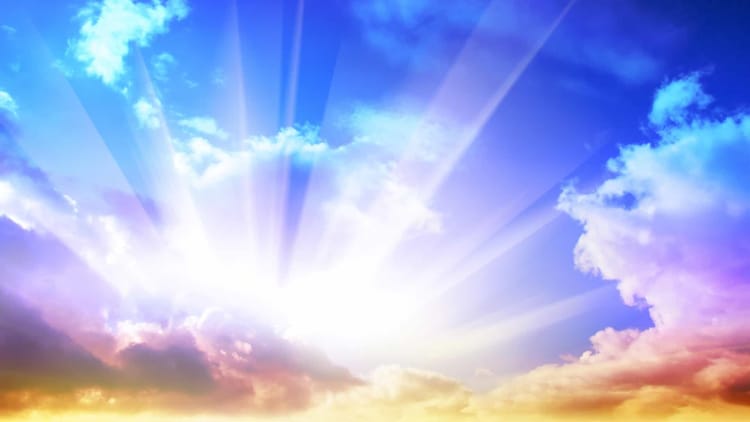Two Kings (Matthew 2)

A couple of weeks ago we looked at the birth of Jesus from the Gospel of Luke. The reason we did this was to remind ourselves that Luke wasn't just writing a nice story about the birth of the baby. He was subverting the rulers of his day. Luke was writing a dangerous story.
Caesar Augustus, the emperor, started a twelve-day Advent celebration in 17 BC to celebrate the beginning of a new era. He called himself a son of god, a savior who brought peace to the world. Luke comes along and says that it is Jesus, not Caesar, who is the real Son of God, the Savior who brings Good News of peace to the world. Jesus, not Caesar, is Lord.
Today, I'd like to enter the world into which Jesus was born once again. To really understand the birth of Jesus in the Bible, we need to understand a little about that world. Next week, we will analyze Mary's song, known as the Magnificat, and explore its revolutionary message for the world.
Matthew 2:1 says that "Jesus was born in Bethlehem in Judea, during the time of King Herod." The question is, who is King Herod?
Back in that time, the whole world was united under one man, Caesar Augustus. He ruled a vast area, all the way from Britain in the west to India in the east and down into Africa. It's impossible to rule that big an area on your own. It would take months to travel from one part of the kingdom to the other. So Caesar appointed kings to rule over portions of his kingdom. The king over Israel was a man named Herod. He started out as military governor over Galilee in 47 BC and became king of Judea in 40 BC.
So what was he like? Well, he was called Herod the Great, and for a good reason. As someone has said, "He was 'great' in everything he did, whether it was good or bad." As I researched his life, I came back to three words: accomplishments, power, and legacy. So let's talk for a few minutes about each of these as the backdrop for the birth of Jesus.
Accomplishments
To start out with, Herod the Great was a man who accomplished much. His main achievements were his ascent to power, his construction projects, and his wealth. Many people visit Israel today in search of Jesus, but there is far more physical evidence of Herod than of Jesus, even now.
Herod was a visionary builder. All of his buildings were strategic, part of his effort to win support and to stay in power. The last Temple that ever stood, the one that Jesus would have known, was called Herod's Temple. Here's a picture of what they think it might have looked like.
The Temple that had stood for the past few hundred years was small and humble, nothing like the original Temple that Solomon had built. In 20 BC, Herod announced that the Temple would be torn down and replaced with something truly magnificent. Few people believed him, but Herod went to work.
The problem that he had was that the Temple Mount wasn't large enough for what Herod wanted to build. So, Herod essentially built huge retaining walls and underground vaults to create a bigger surface upon which to build. He turned a normal mountain with steep declines into a giant rectangular platform. The Western Wall or Wailing Wall is part of that project, and it still stands today.
Herod's Temple was one of the biggest construction projects of that time, and some have compared it to one of the seven wonders of the world. The Temple itself was made of marble, not local stone, and would have gleamed in the daylight.
When the original Temple had been built, the Bible reports that "no hammer, chisel or any other iron tool was heard at the temple site while it was being built" (1 Kings 6:7). Some think that this was the case when Herod rebuilt the Temple as well, which means that the stones would have been moved from elsewhere.
Now this is amazing. The stones that Herod used to build the walls around the Temple are called Herodian Stones. They are all different sizes, but most of these stones are about five feet tall. The largest stone they've found so far is 44 feet by 11 feet and weighs 628 tons. That's the weight of 465 cars. What is truly amazing is that today's best cranes can only lift 250 tons. They still haven't figured out exactly how they were able to move stones this huge in place.
You'll remember when Jesus and the disciples saw the Temple. One of the disciples said to Jesus, "Look, Teacher! What massive stones! What magnificent buildings!" (Mark 13:1). The rabbis of the day stated, "He who has not seen the temple of Herod has never seen a beautiful building."
But the Temple wasn't the only building that Herod built. In the middle of the wilderness, he built a fortress called Masada. He built a wall with thirty-seven high turrets around the summit of the mountain and a casemate wall around the entire summit. This was a huge undertaking, since the summit was 600 meters long and 300 meters across at its center.
Herod didn't design Masada merely as a fortress, but as a royal stronghold with spacious palaces, a bathhouse with all the conveniences available at the time, and a number of smaller palaces, apparently for housing the monarch's relatives. The most amazing is the northern palace, which appears to dangle over the precipice.
Now, you see what the area is like. It's one of the most arid places in the land. You get thirsty just looking at the terrain. But Herod built what was then considered to be a state-of-the-art bathhouse. How did he get water? He also built twelve enormous cisterns, which collected the floodwater that flowed toward Masada. Together the cisterns could hold 40 thousand cubic meters of water, enough not only for drinking but also for the swimming pools, the bathhouses, and agriculture. Beasts of burden carried the water from the cisterns to the top of the mountain on special trails. He also had huge storerooms for food.
I could go on about other places, but I'll just mention one more. Herod needed contact with the Roman world for military support and for trade, so he built Caesarea as one of the most spectacular seaports of the ancient world. The harbor was built using materials that would allow the concrete to harden underwater, and was built to accommodate 300 ships. Caesarea had a large theater, an amphitheater, a hippodrome, and a massive temple to Augustus. The city was almost completely covered with imported marble. It had an elaborate sewer system designed to be cleansed by the sea. He built an aqueduct to precise specifications to bring in fresh water from over ten miles away. The place is an engineering marvel.
The Roman historian Josephus writes, "The king triumphed over nature and constructed a harbor larger than the Piraeus [the port in Athens]… Notwithstanding the totally recalcitrant nature of the site, he grappled with the difficulties so successfully, that the solidity of his masonry defied the sea, while its beauty was such as if no obstacle had existed."
So you get an idea of why Herod was called great. We haven't even talked about Herod's riches. Herod financed all of this through exorbitant taxes that made life unbearable for the average worker. He had tremendous wealth and he controlled major trade routes. Some have suggested that he may have been the richest person who ever lived. Those are just some of Herod's accomplishments.
Power
So what about Herod's and his hold on power? I don't think it would be an exaggeration to say that Herod would stop at nothing to maintain his grip on power. When he became king, he executed 45 of the 70 Sanhedrin members who had resisted him. (The Sanhedrin was the body of leaders who ruled over the nation of Israel.) He appointed the high priest, but when the high priest got a little too popular, Herod invited him over, filled him with wine, suggested that he go for a little swim, and then drowned the man.
Hundreds of friends and family members, along with supporters of his adversaries, were slaughtered on the slightest of accusations. Augustus joked that it was preferable to be Herod's pig than Herod's son, because as a nominal Jew Herod had at least some scruples about killing pigs.
Herod eventually came down with a debilitating illness. Before he died in his palace in Jericho, he feared that nobody would mourn his passing, so he came up with a plan. Josephus writes, "He got together the most illustrious men of the whole Jewish nation, out of every village, into a place called the Hippodrome, and there shut them in." He then gave orders that upon his death, all the Jewish leaders be killed, so that there would be mourning upon his death instead of rejoicing. Herod was a tyrant, so much so that the Biblical story of Herod killing all the boys under two years of age in Bethlehem wouldn't have hardly been noteworthy compared to his other actions to hold on to power. Injustice was just part of life under Herod.
Herod didn't have to fear an uprising from the west, because that was where Rome was. Herod was afraid, however, of an invasion from the east. It's in this context that Matthew writes, "Magi from the east came to Jerusalem and asked, 'Where is the one who has been born king of the Jews? We saw his star when it rose and have come to worship him'" (Matthew 2:1-2). And it's probably a bit of an understatement when Matthew continues, "When King Herod heard this he was disturbed, and all Jerusalem with him" (Matthew 2:3). Disturbed was only the start. He would have been alarmed at the prospect of the newborn king usurping his rule, so he killed the babies in Bethlehem. It was a savage act, even though the numbers are probably less than we normally think — perhaps as few as 5 or 6. Herod wouldn't put up with any rivals.
As you hear about Herod, you get a sense of why the people would have longed for deliverance. They lived in a time of powerlessness and injustice. They were being taxed far beyond what they could afford and could barely afford to make a living. Herod lived with unrivaled power, and it looked like things would never change. It's in this context that a baby is born in the shadow of one of Herod's fortresses in a little place called Bethlehem.
This means the Christmas story is for people who, like those that live in Herod's day, are longing for deliverance. Herod is no longer around, but there are many today who know what it's like to be powerless, to long for freedom from injustice and deliverance from evil. The birth of Jesus is for people who long for Herod to be overthrown and for justice and freedom to reign.
There's one area in which I think we have a lot in common with the people of that day. It would have been incredibly hard for people back then to put their faith in Jesus because every appearance said otherwise, just like today. You know as well as I do that it sometimes takes a massive amount of faith to believe that Christ's kingdom is more powerful than the kingdoms of this world.
How can someone believe that the Messiah is in a manger while Herod sits in power in a fortress? How could they believe that, contrary to appearances, it's not Herod who is in power but the boy in a stable? It takes eyes of faith to see God's reality, contrary to appearances.
A ministry called Follow the Rabbi says this:
Today it may sometimes appear as if Jesus is not at the right hand of God, Lord of heaven and earth. Look around you and it may seem as if the evil descendants of Herod (the followers of the devil) are the dominant power. In times like these, just as in Jesus' day, God asks us to commit to and live by the reality that Jesus is Lord. Be encouraged. Evil may appear strong, but God is in control. Herod appeared all-powerful, but God was in the manger.
Legacy
The last area I want to look at is Herod's legacy. Herod was, well, great. He ascended to the peak of power and accumulated unimaginable wealth. He had tremendous influence. He controlled major trade routes and built cities and buildings to show his power. There are few people who have accomplished more than Herod.
But even the accomplishments of a man like Herod don't last. Despite all of his glory, the buildings and cities he built for himself now lie in ruins. He is remembered today as a violent and egocentric man. All that remains of his life are massive ruins and a bad reputation. He lived for no higher purpose than himself and his own glory, and everything that he lived for is, well, history.
But there was another builder in Jesus' day. He was born in the humble birthplace of Israel's greatest king. He was born among animals. He grew up in obscurity and was mocked as an adult for his humble background. He never built any buildings and never had any official power. He, too, was called King of the Jews, but only in jest. And long after all other kings and kingdoms fall, his Kingdom will never end.
The kingdom of this world
Is become the kingdom of our Lord,
And of His Christ, and of His Christ;
And He shall reign for ever and ever,
King of kings, and Lord of lords,
And Lord of lords,
And He shall reign forever and ever.
What Jesus built, and what his followers continue to build upon, will last forever.
So let me pray for you this morning.
Father, I pray for those of us who long for deliverance. We're tired of Herod's reign. We're tired of the injustice, the cruelty, the powerlessness, the pain. We need a new king. We long for the reign of Jesus. And so we pray, "Your Kingdom come, your will be done on earth as it is in heaven."
Father, give us eyes of faith so we can see your reality. Help us to see that despite appearances, Herod is not supreme. May we understand that "the Most High God is sovereign over the kingdoms on earth and sets over them anyone he wishes" (Daniel 5:21). As we live under the kingdoms of this earth and their apparent power, may we have eyes of faith to see the Kingdom of God and the King who sits on the throne. Herod eventually dies, but your Kingdom just keeps going.
And Father, may we understand that what Jesus built, and what his followers continue to build upon, will last forever. Thank you that a baby has been born, and that cancer and divorce and unemployment and death don't have the last word. God has the last word. It's in Jesus' name we pray, Amen.
(inspired by the series "A Revolutionary Christmas" by Rob Bell)





